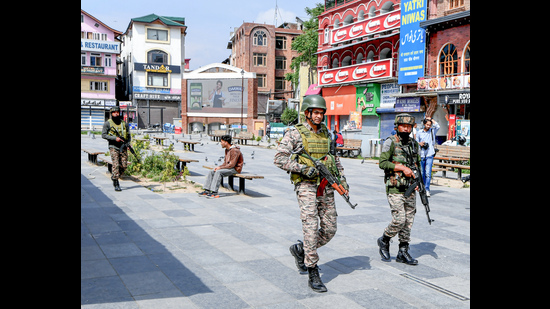China question facing India after Pahalgam
Nations act solely in supreme national interest. China’s response to the Pahalgam terror strike is in steady contrast with its own stand on many issues
China’s response to the rising tensions between India and Pakistan after the terror attack in Pahalgam is evolving in keeping with its interests. Since the Pahalgam terror strike, India has launched a diplomatic blitzkrieg, briefing global leaders. New Delhi began rallying world opinion, stating that it was in possession of intelligence that linked the Pahalgam perpetrators to Islamabad.

To dispel notions of a Beijing-Islamabad nexus, China’s ambassador to India, Xu Feihong, initially tweeted his condolences and urged to “oppose all forms of terrorism” without naming any party a day after the attack. But sensing that Pakistan may get isolated, Chinese foreign minister Wang Yi spoke to his Pakistani counterpart, Ishaq Dar, on April 27, terming Pakistan as an “all-weather” strategic cooperative partner.
Islamabad has stated that it welcomed a transparent investigation into the matter, a line supported by Beijing. When the matter came to the United Nations Security Council (UNSC), Pakistan got a leg up from China in diluting the incident. The UNSC statement read that those responsible for the killings should be held accountable, and resolved to push for international cooperation with all relevant authorities. This is a significant deviation from the UNSC’s position following the 2019 Pulwama attack that sought collaboration with the Indian government and relevant Pakistani authorities.
Earlier in 2019, China teamed up with Pakistan to raise the Kashmir issue at the UNSC after India revoked the erstwhile state’s special status. Beijing has also been instrumental in shielding the perpetrators of acts of terror committed on Indian soil. It has, in the past. blocked efforts to place Jaish-e-Mohammad’s Rauf Asghar, Lashkar-e-Taiba’s Sajid Mir and Abdur Rahman Makki on a UN sanctions list.
Since the abrogation of Article 370, the border issue between India and China has been in constant focus. In 2020, tensions rose following Beijing’s bid to unilaterally alter the status quo along the Line of Actual Control (LAC). Following this, the issue of the contested border with China took centre stage while things were relatively peaceful with Pakistan. In October 2024, India and China finalised patrolling arrangements for friction points in Eastern Ladakh following which, Prime Minister Narendra Modi and Chinese President Xi Jinping met at the BRICS summit in Russia. A cautious normalisation is underway with the decks recently cleared for the Kailash Manasarovar pilgrimage in Tibet to resume. High-level engagement has also resumed with restarting of the Special Representatives mechanism, which was mandated with ways to resolve the boundary question.
Official statements refer to the China-Pakistan relationship obsequiously “as higher than the Himalayas, deeper than the deepest ocean, and sweeter than honey”. Beyond such platitudes, nations act solely in supreme national interest. China’s response to the Pahalgam terror strike is in steady contrast with its own stand on many issues.
First, while Beijing launched crackdowns in the wake of terror strikes on the mainland, it has counselled New Delhi and Islamabad to exercise restraint and de-escalate tensions. While China backs Pakistan in seeking an independent investigation into the terrorist attack, it had hit back at Australia barring its imports after Canberra sought an international investigation into the origins of the Covid-19 pandemic.
Second, with India’s attention now focused on the western border with Pakistan, China could exploit this situation to extract a better deal and terms of engagement along the LAC.
Third, China would be hoping that relations between India and Pakistan further deteriorate, since any conflagration may leave New Delhi’s military firepower depleted. This drained arsenal will further give it leverage in the ongoing LAC negotiations.
The Pakistan-China axis can thus be described as a creeper-client relationship. For Pakistan, this symbiotic relationship may be a ticket out of instability and economic weakness. In turn, a Chinese general has appraised Pakistan’s value in its scheme of things as ‘China’s Israel’.
India’s top military leadership has often warned about the possibility of a two-front war. India seeks a multipolar Asia, as the basis of a multipolar world. This is in contrast with China’s construct of a multipolar world but a unipolar Asia. Beijing is thus incentivised to prop up Islamabad as a counter to New Delhi. Lastly, what will China’s response to a military escalation between India and Pakistan be? In the 1971 and 1999 wars with India, Pakistan’s hopes of China opening a front came to naught, the big question remains will Beijing have the bandwidth to come to Islamabad’s aid at a time when it is bearing the brunt of US President Donald Trump’s tariffs.
Harsh V Pant is vice president, and Kalpit A Mankikar is fellow, China Studies, Observer Research Foundation, New Delhi. The views expressed are personal
All Access.
One Subscription.
Get 360° coverage—from daily headlines
to 100 year archives.



HT App & Website







